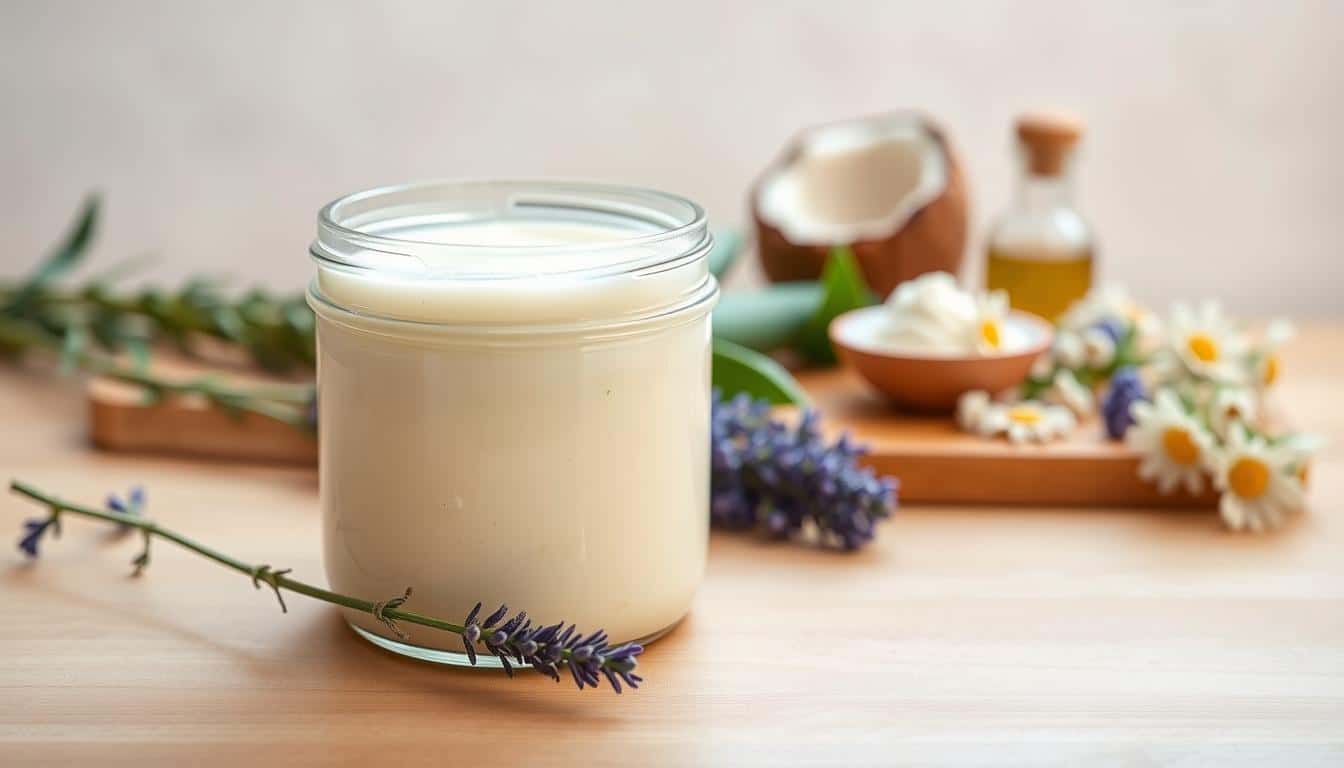Pet owners are turning to natural remedies more and more. They want to know how to use essential oils for their dogs safely. While certain oils can help soothe skin issues and boost health, not all are safe for dogs. This guide will cover which essential oils are good for dog skin care. It ensures your pet stays happy and healthy.
Understanding Essential Oils and Their Benefits
Essential oils are a big hit with those who love natural health and have pets. They are made from parts of plants like leaves, flowers, and roots. This is mainly done through steam distillation. These oils capture the very essence of the plant, guarding against pests and diseases. For humans and dogs alike, essential oils bring many benefits.
What are Essential Oils?
Essential oils stand out because they are concentrated and have a pleasing scent. But their power isn’t just in how they smell. They also have healing qualities. People use them to feel better, reduce stress, boost mood, and care for their skin.
The Origins of Essential Oils
Essential oils come from a long history in many traditions. They’ve been used for thousands of years for healing, in aromatic rituals, and to make perfumes. The ancient Egyptians, Greeks, and Romans all knew about the healing powers of these oils. Though times have changed, the reasons people use essential oils remain the same.
Common Uses of Essential Oils
Essential oils are used in many ways. Common uses include:
- Aromatherapy to enhance emotional well-being.
- Topical application for skin issues and muscle soreness.
- Natural cleaning products that promote a healthier home.
- Calming effects that can benefit dogs, helping them feel relaxed during stressful situations.
Are Essential Oils Safe for Dogs?
Essential oils help people in many ways. But when it comes to dogs, we must be careful. The strong nature of these oils could be harmful, making it important for owners to stay alert. It’s vital to understand these risks to keep your dog safe while using these products. Learning how to avoid danger can make using essential oils around dogs safer.
Risks Associated with Essential Oils
Some essential oils can be harmful to dogs if they swallow them, breathe them in, or get them on their skin. They might cause:
- Skin irritation or rashes
- Gastrointestinal distress when ingested
- Respiratory issues from inhalation
Even a little bit can be dangerous. It’s important to keep essential oils away from your dog. Make sure to use them in places that have good air flow.
Key Considerations When Using Essential Oils
Think about a few things before using essential oils around your home:
- Research each oil and its effects on dogs
- Consult a veterinarian to determine which oils are safe
- Monitor your pet’s reactions upon exposure
Knowing the risks helps you make smart choices, creating a safer space for your pets. Keeping our furry friends safe around essential oils is something we must all do. This requires learning and always paying attention.
What Essential Oils are Safe for Dogs?
Choosing the right essential oils for dogs is important. They can help with anxiety, skin issues, and overall health. It’s crucial to know which ones are safe. Also, learned how to use them correctly. This ensures your dog benefits without any risks.
Top Dog-Friendly Essential Oils
- Lavender: Known for its calming properties, lavender helps reduce anxiety and promotes relaxation.
- Chamomile: This oil provides soothing effects, particularly for irritated skin and digestive issues.
- Myrrh: Valued for its antiseptic qualities, myrrh can aid in healing minor wounds.
- Ginger: Aids digestion and may alleviate nausea and discomfort.
- Rosemary: Acts as a natural insect repellent while promoting skin health.
- Bergamot: Useful for uplifting mood and alleviating stress.
- Frankincense: Offers support for inflammation and can promote overall wellness.
How to Use These Oils Safely
Proper use of essential oils for dogs is crucial. Always mix them with a carrier oil before application. Test a small area first to check for allergic reactions. Using oils in a diffuser can make your home pleasant without overpowering your pet. Talk to your vet before starting. This ensures your method is safe and beneficial.
What Essential Oils are Bad for Dogs?
It’s important for pet owners to know which essential oils can harm dogs. Some oils are toxic and should never be used around them. Knowing which ones are harmful can protect your dog’s health and create a safe home.
Common Toxic Essential Oils to Avoid
Several essential oils can be dangerous for dogs. It’s critical to know which ones not to use:
- Cinnamon
- Clove
- Hyssop
- Citrus oils
- Pennyroyal
- Peppermint
- Pine
- Sweet birch
- Tea tree
- Wintergreen
- Ylang-ylang
- Lemongrass
Exposure to these oils can cause liver damage, breathing problems, or stomach issues. Keeping your dog away from these oils is key to their health.
Symptoms of Essential Oil Poisoning
Watch closely for signs of poisoning from essential oils in dogs. Some common signs include:
- Vomiting
- Diarrhea
- Weakness
- Tremors
- Difficulty breathing
- Excessive drooling
- Seizures
If you think your dog has been poisoned by toxic oils, act fast. Watching how they act and their symptoms is crucial for their recovery.
Symptoms of Essential Oil Poisoning in Dogs
Knowing the signs of oil poisoning in dogs is key. Many signs may show that a dog is reacting badly to essential oils. It’s important for owners to watch their pets closely.
Signs to Watch For
Look out for these common symptoms of essential oil poisoning:
- Vomiting
- Diarrhea
- Drooling excessively
- Difficulty breathing
- Unusual changes in behavior
Sometimes, you might smell the oil on the dog’s breath or coat. Seeing any of these signs should alert dog owners.
When to Seek Veterinary Help
Quick action is critical when you see these health warning signs. Call a vet right away if the dog’s symptoms get worse or if it seems in a lot of distress. Getting help quickly can lead to better outcomes and lower risks from essential oil poisoning.
How to Safely Use Essential Oils Around Your Dog
When you use essential oils near dogs, it’s key to do it right to keep them safe. Knowing the right way to use and spread the oils helps protect your pet. This lets you enjoy their sweet smells without worry.
Best Practices for Diffusion and Application
To diffuse oils safely, follow these steps:
- Select only pet-safe essential oils known for their mildness.
- Limit the concentration of oils when diffusing them in your home.
- Establish a space where your dog can leave if they become uncomfortable.
- Clean any surfaces that may come into contact with the oils to prevent accidental ingestion.
- Avoid applying essential oils directly to your dog’s skin or coat.
Consultation with Your Veterinarian
Always talk to your vet before using essential oils for your dog. They can offer advice that’s right for your pet’s needs and health. This keeps you on the safe side, ensuring your dog’s well-being.

Safe Essential Oils for Dog Skin Care
Essential oils are great for improving dogs’ skin health. They help with different skin issues. It’s vital to pick the right oils for treating dog skin effectively. Here’s some advice on choosing the best oils and how to use them safely.
Recommended Oils for Skin Conditions
Some essential oils are perfect for treating skin problems in dogs. These include:
- Lavender: This oil helps calm and heal irritated skin.
- Chamomile: Great for lessening inflammation, perfect for rashes or dry patches.
- Ginger: It reduces skin discomfort and boosts blood flow.
- Myrrh: With its antiseptic qualities, myrrh aids in healing cuts.
How to Dilute Essential Oils for Dogs
Mixing essential oils correctly is key for your dog’s safety and the treatment’s success. Always dilute essential oils with a carrier oil before using them on your dog’s skin. Follow these steps:
- Pick a top-quality carrier oil, like coconut or olive oil.
- Combine one drop of essential oil with 1 tablespoon of carrier oil.
- Test a small skin area on your dog for reactions first.
- Gently apply the mix to the problematic spot, watching for any negative responses.
Alternatives to Essential Oils
If you have pets and need alternatives to essential oils, there’s good news. Many commercial dog care products are made just for your furry friend’s skin. These items are safe and deal with issues like allergies and skin irritations well. They’re a worry-free option compared to essential oils, ensuring your dog stays healthy and happy.
Commercial Products for Dog Skin Care
Lots of brands offer excellent commercial dog care products for skin health. Here are a few top picks:
- Vet’s Best Skin Relief Spray: A soothing blend of natural ingredients that helps alleviate itching and irritation.
- Earthbath Oatmeal and Aloe Dog Shampoo: Designed to moisturize and calm sensitive skin, making it a great choice for dogs with allergies.
- Burt’s Bees Natural Hypoallergenic Dog Shampoo: Formulated with beeswax and honey, this product is gentle and effective for delicate skin.
Plant-Based Oils and Their Benefits
There are also plant-based oils that are good for dog skin care. Some good options include:
- Sweet Almond Oil: Rich in vitamins, it helps to nourish and moisturize the skin.
- Jojoba Oil: Mimics the skin’s natural oils and can aid in balancing moisture levels.
- Coconut Oil: Known for its antibacterial properties, it helps to soothe irritated skin and reduce inflammation.
Using Essential Oils for Specific Skin Conditions
Essential oils are great for treating skin conditions in dogs, like allergies and irritations. Many dog owners look for natural options. The calming and healing benefits of lavender and chamomile oils are perfect for dogs with skin problems.
Skin Allergies and Irritations
Dogs with skin allergies might have rashes, itchiness, or hot spots. Lavender oil can soothe these symptoms. Chamomile oil also helps reduce swelling and heals affected skin.
Fungal and Bacterial Infections
For fungal and bacterial infections, essential oils are very useful. Tea tree and oregano oils get rid of fungi and bacteria well. Remember, it’s crucial to dilute essential oils right to protect your dog’s skin while it heals.
What to Consider Before Using Essential Oils
Before you start using essential oils for your dog, there are important things to think about. It’s a good idea to talk to a holistic vet first. They can give advice that’s just right for your pet.
This helps make sure you choose oils that are safe and work well with any treatments your dog already has.
Consulting a Holistic Veterinarian
A holistic veterinarian knows a lot about natural and alternative treatments. They are great at giving advice on essential oils. They can suggest which oils to use, how to apply them, and how much to use.
They also look at any health issues your dog has to avoid bad reactions.
Monitoring Your Dog’s Response
When you start using essential oils, watch how your dog reacts. You should keep an eye out for signs that they aren’t feeling well or acting oddly. Taking notes on how your dog acts can help you figure out if the oils are a good fit.
Conclusion
Using essential oils for your dog’s skin care can be good if done carefully and correctly. Knowing the safe oils and how to apply them is key to success. It’s also crucial to talk with a vet to make safe choices for your pet’s health.
When thinking about essential oils for dogs, always put their safety first. By understanding the benefits and risks, you can use these natural remedies wisely. Making informed choices and watching how your dog reacts to treatments is important for their skin health.
Being proactive leads to healthier and happier pets. This way, you and your dog can enjoy nature’s benefits safely. A careful and thoughtful approach ensures you both get the most from essential oils.
FAQ
What are the benefits of using essential oils for dogs?
Are essential oils safe for all dogs?
What should dog owners do if they suspect essential oil poisoning?
How can I safely use essential oils around my dog?
What essential oils are generally safe for dogs?
What symptoms indicate that my dog might be having a reaction to essential oils?
Are there commercial alternatives to essential oils for dog skin care?
How can essential oils assist with skin allergies in dogs?
Can essential oils affect the behavior of dogs?
Why is consulting a holistic veterinarian important before using essential oils?
Content created with the help of Artificial Intelligence.



